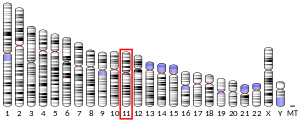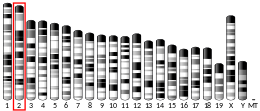Alkb homolog 3, alpha-ketoglutaratedependent dioxygenase
AlkB homolog 3, alpha-ketoglutaratedependent dioxygenase is a protein that in humans is encoded by the ALKBH3 gene. [5]
Function
The Escherichia coli AlkB protein protects against the cytotoxicity of methylating agents by repair of the specific DNA lesions generated in single-stranded DNA. ALKBH2 (MIM 610602) and ALKBH3 are E. coli AlkB homologs that catalyze the removal of 1-methyladenine and 3-methylcytosine (Duncan et al., 2002 [PubMed 12486230]).
References
- 1 2 3 GRCh38: Ensembl release 89: ENSG00000166199 - Ensembl, May 2017
- 1 2 3 GRCm38: Ensembl release 89: ENSMUSG00000040174 - Ensembl, May 2017
- ↑ "Human PubMed Reference:".
- ↑ "Mouse PubMed Reference:".
- ↑ "Entrez Gene: AlkB homolog 3, alpha-ketoglutaratedependent dioxygenase". Retrieved 2017-03-04.
Further reading
- Sundheim O, Vågbø CB, Bjørås M, Sousa MM, Talstad V, Aas PA, Drabløs F, Krokan HE, Tainer JA, Slupphaug G (2006). "Human ABH3 structure and key residues for oxidative demethylation to reverse DNA/RNA damage". EMBO J. 25 (14): 3389–97. doi:10.1038/sj.emboj.7601219. PMC 1523172. PMID 16858410.
- Liu BQ, Wu YD, Li PH, Wei JX, Zhang T, Liu RL (2007). "Prostate cancer antigen-1 as a potential novel marker for prostate cancer". Asian J. Androl. 9 (6): 821–6. doi:10.1111/j.1745-7262.2007.00279.x. PMID 17968469.
- Monsen VT, Sundheim O, Aas PA, Westbye MP, Sousa MM, Slupphaug G, Krokan HE (2010). "Divergent ß-hairpins determine double-strand versus single-strand substrate recognition of human AlkB-homologues 2 and 3". Nucleic Acids Res. 38 (19): 6447–55. doi:10.1093/nar/gkq518. PMC 2965238. PMID 20525795.
- Chen B, Liu H, Sun X, Yang CG (2010). "Mechanistic insight into the recognition of single-stranded and double-stranded DNA substrates by ABH2 and ABH3". Mol Biosyst. 6 (11): 2143–9. doi:10.1039/c005148a. PMID 20714506.
- Malki K, Uher R, Paya-Cano J, Binder E, Rietschel M, Zobel A, Mors O, Hauser J, Henigsberg N, Jerman B, Souery D, Placentino A, Ng MY, Cohen-Woods S, Sluyter F, Farmer A, Aitchison KJ, Craig IW, Lewis CM, McGuffin P, Schalkwyk LC (2011). "Convergent animal and human evidence suggests a role of PPM1A gene in response to antidepressants". Biol. Psychiatry. 69 (4): 360–5. doi:10.1016/j.biopsych.2010.08.011. PMID 20970119.
- Tasaki M, Shimada K, Kimura H, Tsujikawa K, Konishi N (2011). "ALKBH3, a human AlkB homologue, contributes to cell survival in human non-small-cell lung cancer". Br. J. Cancer. 104 (4): 700–6. doi:10.1038/sj.bjc.6606012. PMC 3049579. PMID 21285982.
- Dango S, Mosammaparast N, Sowa ME, Xiong LJ, Wu F, Park K, Rubin M, Gygi S, Harper JW, Shi Y (2011). "DNA unwinding by ASCC3 helicase is coupled to ALKBH3-dependent DNA alkylation repair and cancer cell proliferation". Mol. Cell. 44 (3): 373–84. doi:10.1016/j.molcel.2011.08.039. PMC 3258846. PMID 22055184.
- Koike K, Ueda Y, Hase H, Kitae K, Fusamae Y, Masai S, Inagaki T, Saigo Y, Hirasawa S, Nakajima K, Ohshio I, Makino Y, Konishi N, Yamamoto H, Tsujikawa K (2012). "anti-tumor effect of AlkB homolog 3 knockdown in hormone- independent prostate cancer cells". Curr Cancer Drug Targets. 12 (7): 847–56. PMID 22515525.
- Yamato I, Sho M, Shimada K, Hotta K, Ueda Y, Yasuda S, Shigi N, Konishi N, Tsujikawa K, Nakajima Y (2012). "PCA-1/ALKBH3 contributes to pancreatic cancer by supporting apoptotic resistance and angiogenesis". Cancer Res. 72 (18): 4829–39. doi:10.1158/0008-5472.CAN-12-0328. PMID 22826605.
This article incorporates text from the United States National Library of Medicine, which is in the public domain.
This article is issued from
Wikipedia.
The text is licensed under Creative Commons - Attribution - Sharealike.
Additional terms may apply for the media files.



